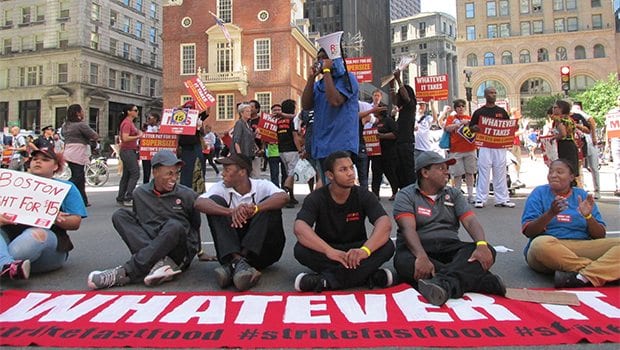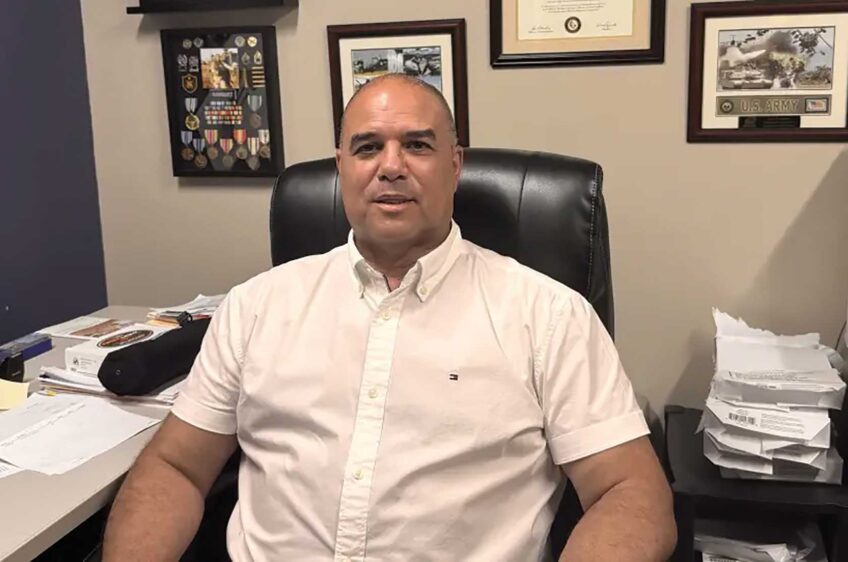Boston fast food workers strike as part of national fight for higher wages

Nine people were arrested as hundreds of fast food workers in Boston went on strike as part of a nationwide effort to raise wages and secure benefits for some of the lowest paid workers in the U.S.
Across the country, fast food employees and labor activists are demanding $15 an hour, paid sick time, paid vacation, better health care and the right to unionize.
Striking workers in Boston expressed frustration with wages they say are below the cost of living.
“We start off at $8; we’re supposed to get raises that aren’t being given, no sick time, nothing,” said Popeye’s Chicken worker Eric Whatley, who commutes from New Bedford to Roslindale for work. “I’m fed up. We work hard and deserve more recognition for it. There are a lot of people who are afraid of striking. I’m not worried about it. I’ll find something better. I’m tired of this.”
There are at least 42,000 fast food workers in Boston, working for an average of $9.30 an hour according to information put out by MassCoalition. The minimum wage in Massachusetts is set to go up from $8 to $9 on Jan. 1, 2015, increase to $10 an hour on Jan. 1, 2016 and again increase to $11 an hour on Jan. 1, 2017.
But advocates, activists and local politicians say that those increases are not enough to live on and they aren’t coming fast enough for workers struggling to get by.
McDonald’s, Burger King, Dunkin Donuts, Popeye’s Chicken and other restaurants’ employees gathered in Downtown Crossing at the Irish Famine Memorial to hold a march through the streets.
The rally moved from the Irish Famine Memorial to the corners of Washington and Milk streets, where protesters sat in the middle of the street as a form of civil disobedience. A large banner dropped out of the window of a building across the street from the restaurant reading “Fight For $15,” which drew cheers from the large crowd.

Fast food workers and labor activists rally on Washington Street. (Banner photo)
Protesters blocked street traffic and stormed into a McDonald’s on Washington Street, chanting, “hold the burgers, hold the fries! Make our wages supersize!” Patrons left the restaurant while police prevented anyone else from going in. The protesters left peacefully when the manager asked them to leave.
Hundreds of protesters marched down to State and Congress streets in the Financial District, where the same group of nine protesters sat with a large banner reading “Whatever It Takes,” blocking traffic in the middle of the intersection. These nine protesters were arrested and charged with disturbing the peace.
“People are willing to do whatever it takes to have our voices heard,” said Theresa Jordan, a Burger King employee.
Prior to the fast food walk-outs, personal care assistants held their own rally on the steps of the State House petitioning for a living wage and union representation before joining the fast food employees in marching through the streets. Tourists stood across the street or sat in Duck Boats and took pictures as the crowd chanted, “Fight for $15.”
Carlita Suarez, executive council member for 1199 SEIU and personal care attendant and Karen Chen of the Chinese Progressive Association translated the speeches in Spanish and Chinese respectively.
“In the most recent budget, legislators acknowledged the great importance of homecare workers and homecare assistants by allocating an additional $6.1 million to the homecare budget,” Becca Guttmann of 1199 SEIU said. “Now it is our job to ensure that this money actually gets into the hands of the workers who so need and deserve it.”
Several legislators were on hand to lend support to last week’s rally.
“You can tell what people care about by the way they spend their money,” said state Sen. Pat Jehlen. “We pay people who work on our cars more than we pay people who care for senior citizens and disabled folks. I see how little people in this line of work are paid and it’s outrageous. We give our corporations $25 million in sale tax holidays and the $6 million allocated for these workers is pitiful in comparison.”
There are roughly 32,000 Personal Care Assistants in the Greater Boston Area, 85 percent of whom are women.
“Many PCA workers are in their 60s, 70s or 80s because they cannot retire,” Jehlen said. “I have been in contact with someone who is in their 80s caring for someone who’s 102. There is something very wrong with that system.”
Personal Care Assistant Kilra Hilton cares for the daily needs of an elderly woman in Boston and said that PCA workers can earn anywhere from $9 to $11 an hour.
“We were inspired by the success the Market Basket workers had with their protests and decided to join in on the fast food strike to let people know that we deserve fair pay,” Hilton said. “If people can’t care for their elderly or disabled loved ones, don’t they want the best quality care from a caregiver? We do way more than $15 an hour’s worth of work.”
Hilton said that she cares for one individual, but some workers care for as many as four different people a day, seven days a week without paid vacation or sick time, and no reimbursement for travel expenses.
“I work as a personal care attendant,” Ruthella Logan-Cruz said. “The very thing that we as PCAs need to survive, we are denied. Our job is to care for people who want to stay in their homes if they can’t maneuver throughout the daily act of living. I’ve been doing this work since I was 16. My mother came here as a domestic worker from Trinidad. She and my father made incredible sacrifices for me and my six siblings, and watching her work in this field inspired me to get involved.”






